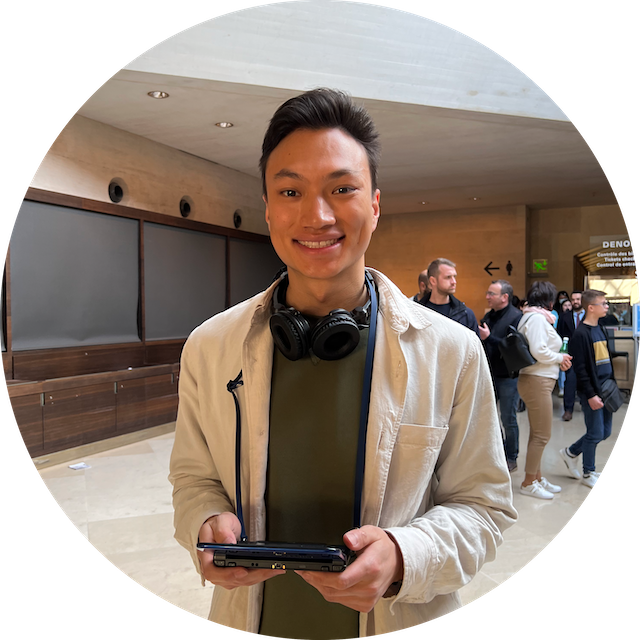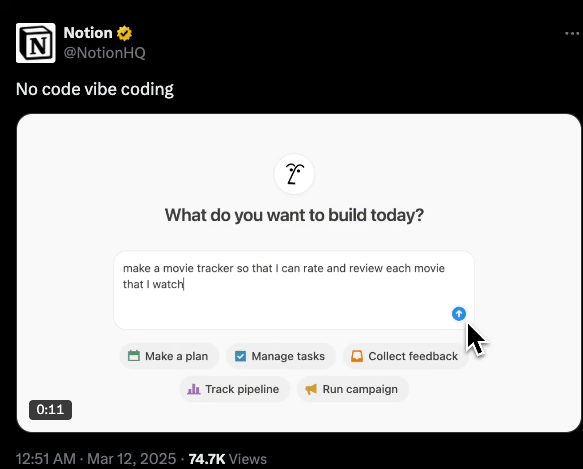This is issue #2 of Stephen’s life updates, covering the past few months. 🙂
🤸 What I’ve been up to
- I joined The Commons, a “fourth place” in Hayes Valley, SF.
“If 1st place is home, 2nd place is work, 3rd places are public spaces like parks, cafes, bars, etc., then a 4th place is a physical space that facilitates meaning-making through intentional programming and pluralistic discussion, where individuals explore questions of ultimate concern without seeking conclusive answers. It honors the authenticity and uniqueness of each person's path while fostering deeper bonds through consistent encounters in a supportive holding environment.”
or in simpler words, “a place to hang out intentionally with cool peeps in SF.” Would recommend!
- I saw Yuja Wang, Vikingur Olafsson, and Elijah Fox in concert!
- Yuja was supposed to perform a dual piano concert with Vikingur at the SF symphony, but a surprise plot twist unfolded instead:
- 75 minutes of continuous Bach with no sheet music. Insane.
“Yuja Wang had come down with an affliction, [a ‘crazy affliction to her finger’], and canceled her appearance with Vikingur Ólafsson of a highly anticipated program for two pianos. The man on stage with the night’s most unenviable job reported that instead, Ólafsson had prepared, on just two hours’ notice, to perform Bach’s complete Goldberg Variations.” - KQED
- I signed my 2nd & 3rd angel checks → Paradigm, a modernized spreadsheet powered by LLM agents, and Meticulous, an automated frontend regression testing platform.
- Angel investing has been a cool way to follow along the arc of companies, learn about the inner workings of businesses and investing, and meet new people.
👥 I’m starting a team!
At Notion, I’m transitioning from the Databases team to leading a new team called Primitive Foundations. The team’s goal is to solve meta problems — whether product, technical, or cultural — involving building Notion’s foundational product systems.
If you know folks who are (1) top-tier engineers, (2) system thinkers, (3) productivity tool power users who know Notion intimately, and (4) live in SF or NYC, or are willing to relocate, let me know.
💻 Side projects
Now that “vibe coding” tools have decreased the friction to coding new things, I’ve taken up a few coding side projects again!
🎨 Shadbook is a storybook for shadcn, tailwindcss, and tailwindcss-animate, which can be used as a starting point for building design systems and UI documentation.
🤖 Turing is a social deduction game where you try to discern who’s AI and who’s human in a chatroom, inspired by games like Mafia & Avalon.
Lots more to do. If you’d like to playtest, or have any cool gameplay ideas, let me know!
🔨 Reflections on LLM tools
Both the side projects above had their code >80% written with Cursor. I’ve become one of the top Cursor users at Notion and am very bullish on adopting these tools.
My take on tools like Cursor & ChatGPT is:
- Advancements in LLM architecture will be seen in history as an invention as impactful as the calculator or printing press. This will profoundly shape society, and the use of these tools will become inevitable.
- A useful mental model is that there exists some prompt(s) + context that will get the ideal output that you want, and being able to express this is a “skill issue”.
- As models (Claude, GPT) and tooling (Cursor, Copilot, etc) get better, the less skillful you’ll need to be in prompting.
- If used well, these tools will make you faster and smarter and multitudes more productive. If used poorly, they make you dumber and lead to worse technical foundations and future problems.
- There is some initial learning curve that one has to overcome to use LLMs well. You must build an intuition around what are its strengths & weaknesses and how to prompt and use context correctly.
- If you’re a junior software engineer, you should should definitely be asking questions as you write LLM-generated code (e.g. “Why did you decide on this architecture? Tell me more about your solution. How does this function work?”).
- You must build good taste & judgement. It’s hard to build good taste without real experience, which is why senior engineers (and designers, PMs, etc) may be sought after more than junior ones. But if juniors put in the work to learn and use tools better than senior ones (due to having more openness and willingness to grind) and then demonstrate this legibly, then they’ll have no trouble finding jobs.
🌆 Reflections on Seattle ↔ SF ↔ NYC
During my last visit to NYC, I realized I wasn't quite a "New Yorker" when my favorite activity was diverting a Saturday night out with a friend to head to the Notion office and work on Turing together after brainstorming the game over dinner.
After spending more time in NYC, I now consider myself qualified to issue sweeping, poorly-informed generalizations comparing life in NYC to Seattle and San Francisco (*as a late-twenty-something working in tech).
In February 2023, I wrote this to a friend who asked for my thoughts on these three cities while deciding where to live:
“generally what I've been telling people is that on this "dopaminergic" spectrum, you have the Midwest all the way on the left, NYC all the way on the right at like 100%, Seattle at like 50%, South Bay at like 30%, and like SF at like 70%. The more "right" on this spectrum, the more stuff there generally is to do, the more active / involvement / excitement driven people are”
My overly simplified model was that you could plot cities on a “dopaminergic spectrum” and this would reasonably model the differences between behaviors of people who lived in these cities.
I also wrote:
“in Seattle (and say, Colorado), most people are more driven by hobbies, don't particularly care as much about work and see it as a means-to-an-end. in SF and NYC, work is a larger part of identity. SF is significantly cheaper than NYC, but there's less to do -- but it still feels like there's more to do than Seattle. SF is a bit more spread out in general (even if you exclude the bay area, which is VERY spread out), and public transit isn't as efficient as NYC or Seattle, but there's still so much to do and explore, it can just be slightly more annoying to get to places than Seattle and NYC. there's no shortage of interesting people and stuff to do, sometimes you just have to seek it out a little bit more in Seattle, SF vs. NYC where the possibilities are abundant. overall, I felt like NYC was too dopaminergic, too addicting, too intense even though I tend to gravitate towards spaces like that. there's a scene from "tick tick boom" where andrew garfield goes "everybody's unhappy in new york, that's what new york is" that I think about sometimes. the sheer optionality of everything and general directional intensity that lives in the culture creates this sense that there's always more to do, more choices, more entertainment, better food, etc.”
I think this somewhat holds up, but what I’d add is:
- In Seattle Big Tech (which is similar to South Bay Big Tech culture), the gravitational pull is towards hobbyism. Conversations at house parties might begin with obligatory work chit-chat (”yeah I work on Cloud at AWS, I got paged twice this week, ugh”) and you can tell nobody really cares. But when the topic shifts to talking about hobbies, that’s when people come alive.
- Status is: “What hobbies are you into? Ikon or Epic? Where are you traveling to this summer? What’s your FIRE timeline?”
- In SF, it’s the opposite. You may start out attempting to catch someone up on your outside-of-work life (because we all want to socially signal that we have a life outside of work), but it’s often when people shift to talking about work, that they become more animated.
- Status is: “What are you building? What did you ship this month? When’s your IPO?“
- In NYC, people attempt to have a vibrant life both in and outside of work, but typically the outside-of-work part takes precedent and is far more vibrant than outside-of-work life in SF. Because there’s an infinite world of stimuli. Endless new people to meet. Dates to go on. Esoteric corners of the city. An inexhaustible supply of new restaurants and events.
- Status is: “What scene are you a part of? What cool experiences have you had lately? What are you wearing? Who are you in this sea of millions of people?”
Of course, every city has all kinds of people, and larger cities make it easier to carve out your own corner. But I do think each city tells us something and exerts its own gravitational pull towards that thing.
As you can probably tell, I've — like nearly every tech company seems to have — converged on San Francisco's ethos.
What will you build today?
📅 Upcoming things
- I’m attending Manifest / LessOnline / SummerCamp: a series of fun “nerd camp” conferences where stats nerds and rationalist-adjacent communities unite.
- I’m attending a couple of weddings, including one in Toledo, OH the weekend of June 14th!
✌️Thanks for reading!
Best,
Stephen





